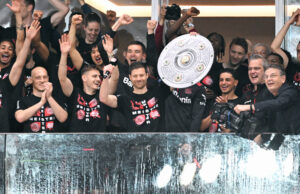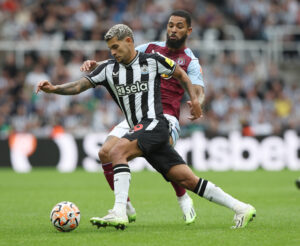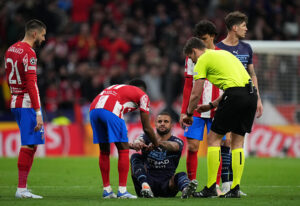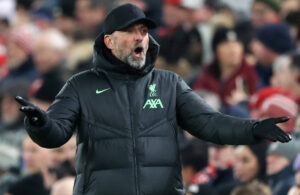Xavi’s return to Barcelona is the 26th time the club have appointed an ex-player to manage their side. Let’s dig deeper into the Barcelona method of employing familiar faces.
Xavi’s Return to Barcelona – The Latest in the Long Line of Cruyff
Mes Que Un Club.
The Catalan motto has become synonymous with Barcelona since the late 1960s, so much so that it’s imprinted into the seats of the main stand of the Nou Camp.
In English, it translates to “more than a club”. But, in recent years, this once-proud institution has been little more than a joke.
From record European losses to losing their greatest ever on a free, Barca have fallen to lows that seemed nigh-on impossible when they last lifted the European Cup in 2015.
Much of the blame for this malaise can be laid at the feet of Josep Bartomeu, whose presidential reign from 2014-2020 can be best characterised as full incompetence, in the signing of players, the appointment of managers and financial management of the club.
Just look at some of the biggest names signed by Barca for big money since the world-record €220 million forced sale of Neymar to PSG in the summer of 2017: Ousmane Dembele. Phillippe Coutinho. Antoine Griezmann.
Have any of them have even been slightly successful? There are myriad reasons for that of course, but the one commonality is the lack of strategic planning for their purchases.
Where were they meant to fit in with Lionel Messi? Who was going to put in the hard yards?
When it comes to the managerial seat in the Nou Camp, it’s been more of a hot seat with four managers in the space of just six years of Bartomeu.
His final appointment was Ronald Koeman, a club hero of the ‘90s, but someone who was not at the level required, albeit not helped by the circus he walked into.
The Dutchman was finally put of his misery this month by Bartomeu’s replacement, the returning Joan Laporta, overseer of the club’s golden period in the mid to late ‘00s.
Xavi’s Return to Barcelona
He replaced Koeman with another legend of the club, arguably one of their biggest in the form of Xavi, the prodigal son returning after a successful stint in the Qatari desert with Al-Sadd – make of that what you will.
In taking the job, Xavi becomes the 26th Barcelona player to later become their manager. Yes, you heard that right – 26th (Twenty-Sixth!).
Put into context, that’s just over 38% of managers in their 122-year history, and a higher figure than managers employed by both Manchester United and Liverpool.
Now at the risk of putting readers to sleep, not all 26 managers will be analysed, with this writer taking on modern Barcelona: from the time of Johan Cruyff to present day.
But Why Have So Many Ex-players Gone on to Manage Los Cules?
It lines up nicely with the club motto, where being part of Barcelona is more than just being part of a football club. The club has long been a pillar of the Catalonia independence movement and was a place of refuge during Franco’s fascist regime.
It seems important that managers have a connection to the region, in one way or another.
Cruyff
Now onto Cruyff. Inarguably one of the most important and influential figures in the history of the game, both as player and manager.
Simply put, he changed how the game was played.
Firstly, as a student and main proponent of the Total Football philosophy implemented into Dutch football in the 1970s by his mentor, legendary coach Rinus Michels.
This had a transformative effect, as Cruyff won three European Cups on the spin with Ajax from ’71-73 and the Netherlands reached back-to-back World Cup finals in ’74 and ‘78, although their star man would only feature in the first.
Cruyff would move to Barcelona in 1973, joining Michels who had signed on two years prior.
Success would be somewhat limited, certainly when compared to their golden-laid years with Ajax. However, the foundations of modern Barca would be laid, as Total Football was slowly infused into the footballing identity of the Catalonian giants.
Cruyff would follow his teacher’s steps into management, first coaching Ajax from ’85-88 before going back to Barcelona, where his career on the touchline became almost as legendary as his one on the pitch.
Upon arriving, a club in debt and in crisis was inherited: low attendances, a bad atmosphere and even worse results – Los Cules had won just one title in the previous 15 seasons, finishing 6th in the year prior to Cruyff’s return.
Taking the risks, he did as a player, mass change was implemented as Cruyff sought to recover the identity he helped develop in the ‘70s.
Immediately, he had his new charges playing in the Total Football style. But not just the first team, the B (reserve) team too, as well as all youth teams.
Ala Will Ferrell in Blades of Glory, Barcelona would now play to one style and one style only.
The Barcelona style or way – an actual defined style of play, not just a vague term used by fans and managers of other clubs: see United’s, both Manchester and West Ham.
Cruyff would also kickstart the club’s youth system, the now renowned La Masia, utilising it to devastating effect. Local players such as Pep Guardiola, Sergi, Guillermo Amor and Albert Ferrer were blooded into the first team alongside established stars like Romario, Michael Laudrup and Ronald Koeman.
This soon reaped major dividends, as the club embarked on the most successful period in their history at the time with major honours scooped up in both Spain and Europe.
This included four successive La Liga titles from ’91-’94, the European Cup Winner’s Cup in ’89 and most significantly of all, the European Cup in ‘92 – both continental victories would coincidentally come over Italian outfit Sampdoria. This would be the club’s maiden capture of “Big Ears”, long overdue given their bitter rivals Real Madrid were six-time winners by this point.
By the time Cruyff left the Nou Camp in ’96, he was the most successful coach in the club’s history, having amassed 11 trophies, but more importantly he had fully embedded a philosophy into the club – every Barca manager since has been judged against his principles.
Van Gaal
While not an ex-player, Barcelona’s next two league titles came under the reign of another disciple of Total Football in the form of Louis Van Gaal, again lured away from Ajax.
Here the Dutch influence at the club became even more pronounced, with so many players being bought that it was a surprise the club’s colours weren’t switched to orange and tulips didn’t sprout out of the Nou Camp turf.
The semi-Netherlands national team was complimented by Guardiola, Sergi and Luis Enrique and debuting Xavi. All four men would captain the club at different points.
Either side of Van Gaal’s two stints (’97-00 & ’02-03), another ex-player would have a not-so-successful spell in charge – Carlos Rexach.
Rexach, Rijkaard
The Catalonian had spent most of his life at the club in a plethora of roles: player, B team coach, assistant coach, multiple time caretaker manager, before landing the big job for a single season.
Good times would come again while Frank Riijkard was at the helm from ’03 to ’08, with another two titles accompanied by the club’s second European Cup.
Again, academy graduates like Lionel Messi, Xavi, Carles Puyol, Andres Iniesta and Victor Valdes would be melded into a side alongside superstars such as Ronaldinho, Deco and Samuel Eto’o.
And you guessed it, Riijkard was Dutch, had played for Ajax and under Michels and Van Gaal. They had a type.
However, by the end of his tenure, the club found itself at a crossroads and in desperate need of a new inspiration.
Pep Guardiola’s Tiki Taka Triumph
Enter Pep Guardiola, possibly the only man to rival Michels and Cruyff for impact on how the game is played.
A local, a legend, an ex-captain but someone who had a sole year in charge of the club’s B team before taking charge.
Guardiola took the learnings from Cruyff and Van Gaal and created “Tiki Taka” – an updated version of Total Football that would be the key to Spain and Barcelona’s golden periods.
In the space of just four years, Guardiola outdid his mentors, landing 14 trophies including three league titles on the bounce and two European Cups in ’09 and ’11. Like Cruyff, both these victories came against one side – Manchester United, the second success widely being recognised as the best club performance of the 21st century.
In the same period, Spain would dominate the international scene with back-to-back European Championships and a World Cup secured – the bulk of the side made up of Catalonia’s finest. No coincidence.
Vilanova and Luis Enrique
Following Guardiola’s departure, his work was continued by his assistant Tito Vilanova and ex-teammate Luis Enrique.
Vilanova, heralded by Messi as being the first coach to trust him in the youth set-up, achieved several significant achievements. His side won La Liga with 100 points, by a record margin of 15 and scored in every fixture.
An entire starting line-up of academy graduates was also fielded against Levante in November ’12. This once again showcased the outstanding success of La Masia and was a testament to everything Cruyff had started all those years before.
Vilanova would be forced to resign and sadly passed away after a battle with cancer in ’14.
Enrique would step in shortly after to immediate effect – landing the treble in his opening season, the club’s second after ’09, with arguably the greatest frontline in modern history. MSN – Messi, Suarez, Neymar. Another La Liga and two more Copa Del Reys would follow before Enrique exited in ’17, alongside Neymar.
Valverde, Koeman, Quique Setien
This is where the trouble began for Barcelona as previously alluded to. Poor squad turnover and financial mismanagement was compounded by several unsuitable managerial appointments – two ex-players in Ernesto Valverde and Koeman sandwiched by Quique Setien.
To be fair, Valverde did win two La Ligas but oversaw European meltdowns versus Roma and Liverpool.
Koeman was simply the wrong man at the wrong time, a club legend sacked despite scoring the winning goal in a European Cup final – sound familiar?
Xavi’s Return to Barcelona: Much to Do
Xavi now steps up to the plate, with his club at its lowest ebb. A limited transfer budget and wage constraints won’t help but he’s not got the worst supporting cast – starlets and soon to be superstars in the fittingly named Gavi, EURO 2020 breakout Pedri and Frenkie De Jong, signed from, drumroll please, Ajax.
He’s also brought back club legend Dani Alves, 38 years young, as somewhat of an on-field lieutenant alongside fellow ex-teammates Gerard Pique, Jordi Alba and club captain Sergio Busquets.
Another old running partner, Sergi, oversees the B team and the prior mentioned Joan Laporta is in the president’s suite.
There’s even a Cruyff on board – Johan’s son, Jordi, named after the patron saint of Catalonia, was appointed as the club’s sporting director last summer.
Going back in time? Maybe.
Will Messi return as a result? Who knows, but he’s already making noise about coming back to help once his playing days end.
But what style will Xavi implement? He’s said he wants the side to play “good football and get good results” Genius!
Jokes aside, this is a man heavily influenced by all those who have gone before him, having played under Van Gaal, Guardiola and Enrique. Someone who will bring the Barca style back to the Nou Camp.
He is the latest in the throne from the line of Cruyff – a succession storyline that might rival the hit television show.
The only thing that feels wrong is that Iniesta isn’t standing next to him as co-manager. Oh well.
Vamos.
Main Photo






